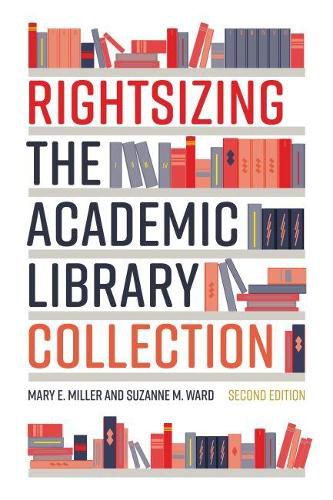Readings Newsletter
Become a Readings Member to make your shopping experience even easier.
Sign in or sign up for free!
You’re not far away from qualifying for FREE standard shipping within Australia
You’ve qualified for FREE standard shipping within Australia
The cart is loading…






This title is printed to order. This book may have been self-published. If so, we cannot guarantee the quality of the content. In the main most books will have gone through the editing process however some may not. We therefore suggest that you be aware of this before ordering this book. If in doubt check either the author or publisher’s details as we are unable to accept any returns unless they are faulty. Please contact us if you have any questions.
By learning how to rightsize, you will ensure that both the collection and your institution’s available physical spaces meet the needs of your library’s users.
Honored with many accolades, including a starred review in Library Journal, the first edition of this book demonstrated the power and flexibility of rightsizing, an approach that applies a scalable, rule-based strategy to help academic libraries balance stewardship of spaces and the collection. In the five years since Ward’s first edition, the shared print infrastructure has grown in leaps and bounds, as has coordination among programs. With this revision, Miller addresses new options as well as the increasing urgency to protect at-risk titles as you reduce your physical collection. Readers will feel confident rightsizing their institution’s own collections with this book’s expert guidance on
the concept of rightsizing, a strategic and largely automated approach that uses continuous assessment to identify the no- and low-use materials in the collection, and its five core elements; crafting a rightsizing plan, from developing withdrawal criteria and creating discard lists to managing workflow and disposing of withdrawn materials, using a project-management focus;
moving toward a facilitated collection with a mix of local, external, and collaborative services; six discussion areas for decisions on participating in a shared print program; factors in choosing a collection decision support tool; relationships with stakeholders; how to handle print resources after your library licenses perpetual access rights to the electronic equivalent; and future directions for rightsizing
$9.00 standard shipping within Australia
FREE standard shipping within Australia for orders over $100.00
Express & International shipping calculated at checkout
This title is printed to order. This book may have been self-published. If so, we cannot guarantee the quality of the content. In the main most books will have gone through the editing process however some may not. We therefore suggest that you be aware of this before ordering this book. If in doubt check either the author or publisher’s details as we are unable to accept any returns unless they are faulty. Please contact us if you have any questions.
By learning how to rightsize, you will ensure that both the collection and your institution’s available physical spaces meet the needs of your library’s users.
Honored with many accolades, including a starred review in Library Journal, the first edition of this book demonstrated the power and flexibility of rightsizing, an approach that applies a scalable, rule-based strategy to help academic libraries balance stewardship of spaces and the collection. In the five years since Ward’s first edition, the shared print infrastructure has grown in leaps and bounds, as has coordination among programs. With this revision, Miller addresses new options as well as the increasing urgency to protect at-risk titles as you reduce your physical collection. Readers will feel confident rightsizing their institution’s own collections with this book’s expert guidance on
the concept of rightsizing, a strategic and largely automated approach that uses continuous assessment to identify the no- and low-use materials in the collection, and its five core elements; crafting a rightsizing plan, from developing withdrawal criteria and creating discard lists to managing workflow and disposing of withdrawn materials, using a project-management focus;
moving toward a facilitated collection with a mix of local, external, and collaborative services; six discussion areas for decisions on participating in a shared print program; factors in choosing a collection decision support tool; relationships with stakeholders; how to handle print resources after your library licenses perpetual access rights to the electronic equivalent; and future directions for rightsizing